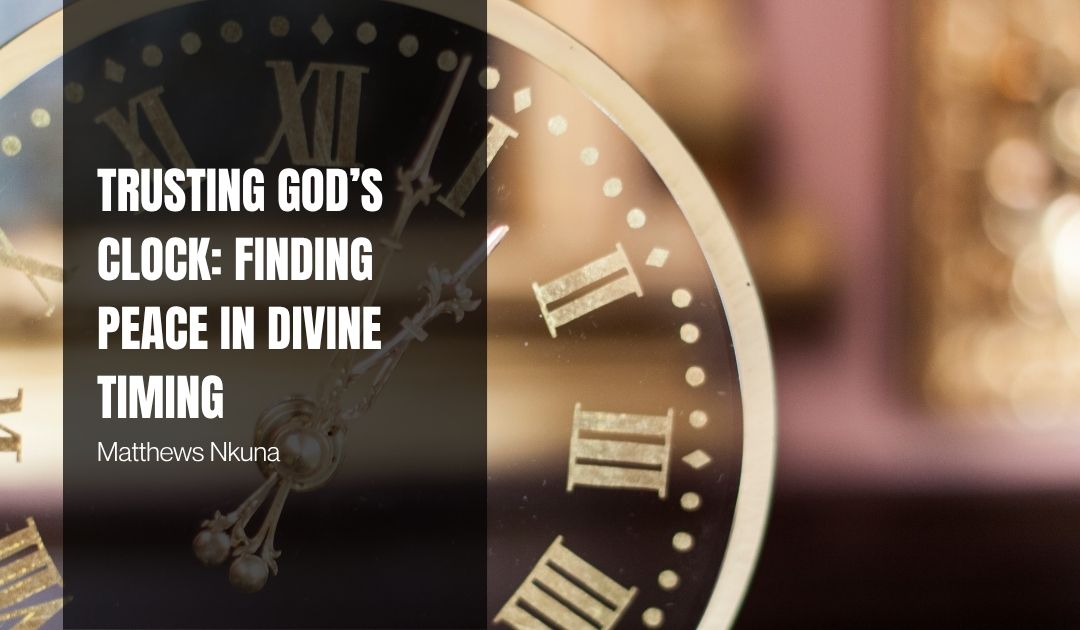Our culture is fascinated with controlling time. Films explore characters leaping between past, present, and future, or moving between parallel universes where different decisions led to alternate timelines. This obsession reveals something deeper about human nature: our desperate desire to be in control.
We sit with regrets, imagining how life might have turned out differently if only we’d made better choices—if we’d studied harder at school, married someone else, or taken that other job. This desire for control reflects a works-based approach to life—a man-centred salvation where we believe we could have invented a better timeline for ourselves.
Yet Ecclesiastes 3:1–15 offers a profoundly different perspective. The passage opens with these familiar words: “For everything there is a season, and a time for every matter under heaven” (v. 1). What follows is a poetic catalogue of life’s contrasts—birth and death, planting and harvesting, weeping and laughing, mourning and dancing. The text exhaustively represents the full spectrum of our earthly existence.
The Rhythm of Life
This poetic section reveals an uncomfortable truth: We don’t actually choose the seasons we experience. Life can feel like an unpredictable series of events, a pendulum swinging from calm to chaos. One moment we’re celebrating new beginnings; the next, we’re grieving painful losses. Life resembles a roller coaster, oscillating between extremes that seem to arrive in an instant.
The author of Ecclesiastes, likely Solomon, writes from a place of frustration. After pursuing achievement and pleasure, he finds himself declaring “vanity of vanities.” The book presents life “under the sun”—that is, life viewed from a purely earthly perspective without God’s redemptive work.
Consider farmers as an illustration. They provide a clear picture that we’re not in control of the seasons. Farmers respond to the seasons; they don’t create them. They plant according to what nature dictates, following the wisdom of what God has placed before them. A man trying to plant tomatoes in winter will find only frustration—the soil is hard and frost threatens any produce. But a woman who watches the signs and plants the right seed in spring will see her garden flourish.
What is the difference? One trusts God’s timing while the other works against it.
Many of us spiritually find ourselves frustrated because we’re trying to force seasons that God hasn’t appointed. We try to speak when we ought to be silent. We attempt to build when it’s time to tear down. But Ecclesiastes reminds us that there is a time for everything, and God holds the clock.
The Reach for Eternity
The passage shifts from poetry to reflection with these profound words: “He has made everything beautiful in its time. Also, he has put eternity into man’s heart, yet so that he cannot find out what God has done from the beginning to the end” (v. 11).
From our perspective, life may be confusing. It’s like looking at the reverse side of embroidered cloth—messy and strange. But from God’s perspective, from the front side, everything is beautiful and as it should be.
God has placed eternity in our hearts. Though we’re time-bound creatures, we possess eternal longings. When life is wonderful, we desperately want it to remain that way. We desire permanence, predictability, understanding of the bigger picture. Yet we live in a world that constantly changes, confronted by mystery and our own limitations. We don’t know what tomorrow holds.
This tension between our desires and divine purpose is meant to draw us closer to God. We long for eternity because we were made for it. We wrestle with time because we’re not its masters. As Psalm 139 reminds us, God has numbered every one of our days. He knows everything there is to know about us.
The Response of Faith
Solomon concludes with a call to action—not to stressful self-reliance, but to faithful living: “I perceived that there is nothing better for them than to be joyful and to do good as long as they live” (v. 12).
Be joyful, he says—not because life is easy, but because God is in control. Joy isn’t the absence of pain; it’s the presence of trust in the Lord. Do good, not to earn salvation (we’re saved through faith in Jesus Christ), but as a reflection of God’s goodness working in us.
The passage affirms that “whatever God does endures forever. Nothing can be added to it, nor anything taken from it” (v. 14). God’s work is eternal. His plan is unshakeable. His timing is perfect. He has made all things for his glory.
Perhaps you feel behind schedule, as though life should have turned out differently. You may feel you’ve missed crucial opportunities. But hear this: God’s timing is never too late, and his purpose is never lost.
Christ, the Fulfilment of Time
The gospel reveals God’s perfect timing most clearly. Galatians 4:4–5 declares: “But when the fullness of time had come, God sent forth his Son, born of woman, born under the law, to redeem those who were under the law, so that we might receive adoption as sons.”
God sent his Son at precisely the right time to redeem us. This demonstrates his sovereignty over time and history. Without Christ, life’s cycles are merely vain repetition. But with Christ, they become redemption. He turns mourning into dancing, death into life. He gives meaning and purpose to our existence.
Living in God’s Time
True peace comes not from controlling life’s seasons, but from trusting God’s timing. We need not master the seasons; we need to trust the master of all seasons.
This calls us to examine ourselves. Are we resting in our own strength, or in what God has done? Are we trusting God’s timing or trying to rewrite the script according to our desires? The wisdom of Proverbs applies here: “Trust in the LORD with all your heart, and do not lean on your own understanding. In all your ways acknowledge him, and he will make straight your paths” (Proverbs 3:5–6).
The gospel is fundamentally about trusting in the Lord, not ourselves. It’s not about what we could have done if things had turned out differently. The apostle Paul models this, forgetting what lies behind and straining forward to what lies ahead (Philippians 3:13–14).
Today, let us go forward not with intent to control, but with intent to be in relationship with the one who is in control. Rather than resting in our own strength—which will only frustrate us—let us rest in what the Lord has done. There is a time for everything, but only one who holds everything in his hands.



